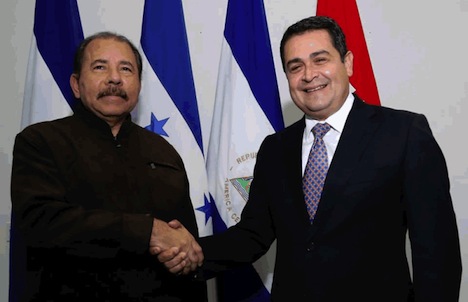Today, Honduras’s president-elect Juan Orlando Hernández met with the presidents of three Central American neighbors — Nicaragua, Costa Rica and Panamá (two of whom will be replaced in elections that are scheduled to be held within the next five months).![]()
![]()
But the photo that most stands out is the one above, with Hernández, the conservative leader of Honduras’s Partido Nacional (National Party) gripping and grinning with Nicaragua’s president Daniel Ortega.
Trade between the two countries is increasingly important, and the two counties still have strained relations over a border dispute in 2000-01. Honduras shares nearly all of its southern border with Nicaragua and, as drug trafficking becomes an increasingly insoluble problem for Honduran security, there are fears that Nicaragua (with a homicide rate that’s equal to just one-fourth of Honduras’s) could destabilize as well. So it’s obviously important for Ortega and Hernández to have a strong working relationship.
But Ortega, as the leader of the Frente Sandinista de Liberación Nacional (FSLN, Sandinista Front of National Liberation) is a stridently left-wing president with little respect for democratic institutions. Though he’s transformed from guerrilla-style revolution in the 1980s into more run-of-the-mill corruption today, he remains the most anti-American (pro-Venezuelan) socialist leader in Central America.
It’s been just a few days since Hernández was determined to be the winner of Honduras’s November 24 election. That result continues to be challenged, but it seems increasingly likely that Hernández will indeed be Honduras’s next president.
But consider a parallel universe where Xiomara Castro de Zelaya, leading the campaign of the firmly leftist Partido Libertad y Refundación (LIBRE, Party of Liberty and Refoundation), had posed with Ortega days after winning the election. You’d have half of Honduras and much of the US policymaking apparatus up in arms about Honduras’s sudden left turn, and it may well have obscured Castro de Zelaya’s first week as president-elect by causing a domestic or international brouhaha.
It’s not a particular commentary on either Castro de Zelaya or on Hernández, but just a point about how critically perception matters in international affairs. What for one candidate is a run-of-the-mill meeting with the leader of a neighboring country would have taken on a much more ominous tone for another candidate.
